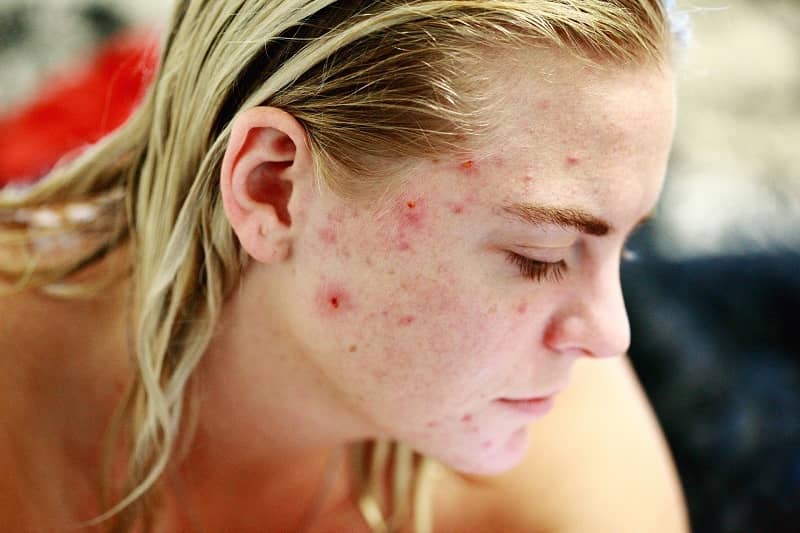If you are dealing with seemingly random rosacea and looking for causes of rosacea flare-ups, you are not alone.
More than 13 million people in the U.S are suffering from this chronic skin disease.
Although there is no exact known causes of rosacea, there are certain factors that may play a role.
Adding to this, rosacea doesn’t have an absolute cure but one can relieve it via topical treatments.
NOTE: Checkout how to relieve rosacea symptoms, if you are looking for remedies to treat painful rosacea.
Moreover, you must know about the triggers that can cause random flare-ups if you are already suffering from them.
So, if you are desperate to find out what causes rosacea flare-ups, you have landed at the right place.
Accompany us till the end to know what is rosacea and what triggers rosacea.
What Is Rosacea?
Rosacea is a common skin disorder that affects your facial skin.
This skin condition causes redness and visible blood vessels on your chin, forehead, nose, and cheeks.
Rosacea is often mistaken for acne or other general skin problems.
Mostly, middle-aged women with light skin are affected with rosacea. However, certain severe cases are also found in men.
Where there is no exact answer to the question of what causes rosacea, there are certain elements that trigger rosacea flare-ups.
Causes Of Rosacea Flare-Ups
Some of the most common factors that cause rosacea flare-ups are as follows:
#1. Intense Exercise
If you are a workout enthusiast and dealing with rosacea at the same time, it might be challenging for you.
Flushing after intense exercise is common in rosacea sufferers.
Intense exercises raise the core temperature of your body which triggers the prominent symptoms of rosacea like redness of the skin and popped blood vessels.
#2. Emotional Stress
Rosacea creates a vicious cycle of stress and outbreaks.
To clarify, rosacea symptoms can shake your confidence level and cause stress, which in turn can worsen your symptoms.
Stress activates the sympathetic nervous system which can lead to flushing.
#3. Hot and Spicy Foods
Spicy food might kick you, but it’s not worth it if you have rosacea.
The cayenne pepper, curries and hot pepper contains capsaicin which is one of the common triggers of rosacea.
Moreover, just like spicy foods, hot foods dilate your blood vessels due to high temperatures and can cause facial redness.
Adding to this, certain specific foods need to be completely avoided to prevent triggering the symptoms.
#1. Yogurt
#2. Avocados
#3. Fermented foods/foods that contain yeast
#4. Chocolate
#5. Vanilla
#6. Citrus fruits and nightshade vegetables (eggplants, tomatoes, potatoes, etc) can also trigger rosacea
#7. Cheese, etc.
#4. Alcohol
It is often believed that alcohol cause rosacea but that’s not true.
Rosacea which is primarily a hereditary condition can get triggered by alcohol.
Some of the beverages that can trigger rosacea are:
#1. Red Wine
#2. White Wine
#3. Beer
#4. Champagne
#5. Vodka
As per the researches, alcohol weakens the immune system and causes the blood vessels to dilate. This in turn contributes to the symptoms of rosacea.
#5. Extreme Temperatures
Whether you are dealing with extremely hot or extremely cold temperatures both are the prevalent triggers of rosacea.
Furthermore, Sunshine and rosacea aren’t really good friends.
Nearly 81% of the patients of the national rosacea society admitted that UV rays trigger their symptoms and make them worse.
Also, severe cold temperatures can dilate your blood vessels leading to visible red veins all over your face.
#6. Body Changes
More women get affected with rosacea as compared to men.
As a result body changes like menopause and pregnancy induces the causes of rosacea flare-ups.
To clarify, menopause is a difficult phase of a women’s life both physically and mentally.
It often causes irregular periods because of which one may experience inflammation leading to redness of the skin.
Also, pregnancy brings a lot of hormonal imbalances which gives rise to potential skin irritations.
And if you are suffering from rosacea, it is obvious that these body changes are going to trigger the symptoms.
You can’t completely cure rosacea.
However, you can try to prevent rosacea flare-ups by making some modest changes in your lifestyle.
How To Prevent Rosacea Flare-ups
This chronic disease can be controlled but can’t be cured.
You can make the following changes in your lifestyle to prevent rosacea flare-ups.
#1. Avoid exposure to extreme temperatures.
#2. Learn to manage stress with deep breathing, meditation, and other stress management techniques.
#3. Avoid hot and spicy foods as well as beverages.
Treating Rosacea with Diet or relieving the rosacea symptoms by making dietary changes is possible.
#4. Try to stay cool by exercising.
For instance, you can use wet towels to wipe your face at regular intervals, you can fragment your workout routine, drink plenty of water and try to work out inside in a well-ventilated room.
#5. Minimize your alcohol intake. Especially red wine.
#6. Avoid citrus foods. So, if you have been wondering are bananas good for rosacea, then the answer is no!
You must avoid bananas and other citrus foods if you are sensitive to histamine because it triggers rosacea.
So, this was all about the causes of rosacea flare-ups and how to prevent them.
Before You Go!
Anyone can get affected with rosacea.
However, it is common in females with light skin and who are above the age of 30.
Also, people with a family history of rosacea tends to show the sign of it.
By now you must have understood that even though rosacea is not completely curable, you can prevent it from getting worse by adapting to certain changes in your lifestyle.
